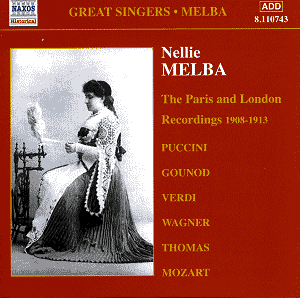The latest volume in Naxos’s Melba series starts with
the relatively unsuccessful Paris session of May 1908 during which only
one side was successfully completed. It includes some famous sides with
Edna Thornton, Sammarco and McCormack – from May 1910 – as well as the
more peripheral distance test disc that has survived from the same day’s
recording. A number of things here were never issued at the time and
existed in test copies held by collectors (though the second take of
the Faust trio was to appear in the 1930s). The bulk of the discs therefore
date from three days of recording in London – 11th, 12th
and 19th May 1910 – with the remainder, bar that single Parisian
survivor emerging after her three-year break from HMV in May 1913.
Ease and fluency of voice production and subtle colouration
were of course attributes she possessed in abundance. In repertoire
both major and more homespun she was equally adept though the now near
century long objections to her coolness of engagement have lasting validity.
There are lighter moments here – Bishop and Landon Ronald – and a rare
example of her Wagner (Elsa’s Dream) and then there are works with which
she was more intimately associated. Having settled into a routine of
recording there are far fewer of the squally moments that could disfigure
her earliest discs. Concerning her occasional flatness of pitch at the
top, which is audible from time to time, it should be borne in mind
that her contemporaries invariably referred to her excellent intonation
though in this respect at least the recordings are rather less forgiving.
Whatever the Parisian problems may have been her Mimi
is extremely cool and Vissi d’arte has a crystalline brilliance
that admits little warmth. She shows her big technique – florid and
full of trills – in Massenet’s Sevillana but there’s rather more
substance and admirable control of line on display in the remake of
Vissi d’arte the following day – presumably the original was
considered lacking but the remake is no more expressively eloquent (indeed
the air of calculation is palpable). I’ve always had a soft spot for
the Faust trio – unpublished at the time - even if the balance does
McCormack no favours (maybe a contributing factor to its being withheld).
With the formidable Edna Thornton’s chesty contralto on board Melba,
McCormack and Sammarco essay the quartet from Rigoletto with considerable
personality, though maybe an incongruous sense of ensemble – to put
it mildly. Bishop’s Bid me discourse was a Piatti favourite
but though Melba arouses admiration for the duration of some held notes
this is all rather too staid and she certainly engages in some whimsically
Anglophone rolling of the "r" in Landon Ronald’s wispy little
Sounds of Earth, not one of his more imperishable masterpieces.
Henschel’s Spring is a winsome little song susceptible to a little
yielding pliancy but Melba is strangely unmoving with it and we are
similarly unmoved. It’s interesting to hear her in an aria antica –
Lotti’s famous Pur dicesti – and her diminuendi are full of acumen,
her trills immaculate – in the context of the day – and her tone full
of freedom even though the tempo is characteristically slow. The Mozart
with Jan Kubelik was recorded at a low level and here I’m afraid Melba
and the Bohemian violinist prove a sympathetically neutral pairing,
her lack of emotive depth mirrored by his tonal deficiencies. You’ll
seldom hear such seraphically self-absorbed coldness. Melba must have
been one of the pioneer Chausson exponents on disc and it’s good that
Naxos’s third volume ends with Le temps des lilas – in which
both singer and especially pianist Gabriel Lapierre distinguish themselves.
By my reckoning there is one volume left in this series.
The transfers are extremely fine – even the Mozart has been rendered
listenable – and at this price a recommendation seems almost superfluous.
Jonathan Woolf


